Grantee Highlights
Featuring organizations that have received grant funding from StopWaste.

Food Waste Prevention & Recovery Grants
Tri-Valley Haven supports survivors of domestic violence, sexual assault, homelessness and poverty, with a focus on Dublin, Pleasanton, Livermore. With a Food Waste & Recovery grant from StopWaste, the nonprofit has not only dramatically increased the amount of fresh, healthy, and nutritious food their food pantry distributes, but also switched to a “client choice model,” empowering pantry visitors to select those items that best suit their lifestyle, traditions, and health needs.
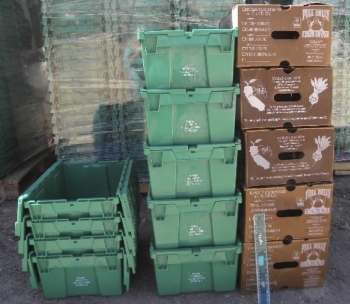
Reusable Transport Packaging Equipment Grants
Full Belly Farm delivers vegetables, fruit, nuts and flowers to restaurants, farmer’s markets and members through host drop sites around the Bay Area and Sacramento. With a Reusable Transport Packaging grant from StopWaste, Full Belly purchased reusable plastic totes to replace the waxed cardboard boxes they had been using for produce delivery. This change is saving the farm $14,161 per year in avoided waxed cardboard box purchases and has resulted in a 36 ton reduction of greenhouse gas emissions.
Reusable Foodware Grants
Many single-use foodware items contain a class of persistent toxic chemicals that can leach into food, accumulate in the body and lead to serious health problems. To eliminate this risk, while also reducing waste, five Unified School Districts in Alameda County are piloting stainless-steel reusable foodware to replace disposable lunch trays, food boats and plastic sporks. Supported by grant funding, some pilots set up infrastructure to wash the dishes in-house while others use off-site dishwashing services.

Community Food Systems Grants
Goodness Village in Livermore is a tiny home community for people transitioning out of chronic homelessness. With a Community Food Systems grant from StopWaste, the nonprofit funded equipment to store and process recovered, surplus food to feed the Village, as well as a program to teach residents to make jams, preserves, and other upcycled food products. These will be sold to the larger local community, with proceeds coming back to support Goodness Village.
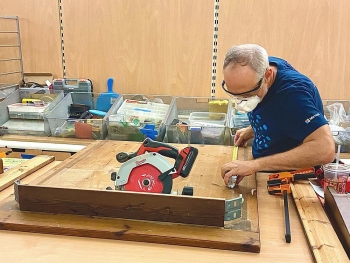
Reuse & Repair Grants
Make It Home Bay Area furnishes homes for those transitioning out of crisis or homelessness with donated, gently used furniture and household goods. With a StopWaste Reuse & Repair grant, the nonprofit rented storage space in Alameda County and hired an additional staff member to move closer to in-county donors and clients and increase the amount of furniture they can repurpose for local needs.

Reusable Foodware Grants
Sparkl Reusables, in partnership with Spectrum Community Services, replaced disposable foodware with durable, reusable containers and tote bags to serve hundreds of hot meals daily to seniors at pick-up sites throughout Alameda County. With the help of a StopWaste grant, Sparkl purchased inventory, set up operations, and trained staff for the collection, cleaning, and redistribution of the reusable foodware.
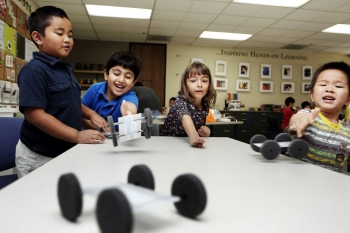
Reuse & Repair Grants
RAFT upcycles donations of surplus materials headed to the landfill into STEAM Project Kits for hands-on, creative science learning and other low-cost teaching supplies, available to educators and guardians throughout the Bay Area. A Reuse Grant from StopWaste enabled RAFT to uplift under-resourced schools in Alameda County with their clever and inspiring STEAM Project Kits as well as other materials and service free of charge.
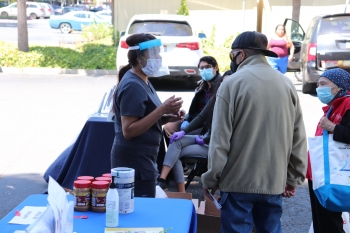
Waste Prevention Equipment Grants
Nonprofit Bay Area Community Health (BACH) provides not only health care and education, but also prioritizes the social and nutritional needs of their patients. Often that means writing a prescription for healthy food from the “Food Farmacy,” a monthly pop-up at BACH’s Liberty Clinic in Fremont. A waste prevention equipment grant from StopWaste has allowed them to purchase new equipment to keep donated fruits and veggies fresher longer.
Reuse & Repair Grants
Founded in Oakland almost 40 years ago, Civicorps runs an extensive job training program for young adults lacking career skills and opportunities, with paid positions in land management and resource conservation. They also offer a high school diploma program for young adults ages 18-26, as well as access to wrap-around support services to help with childcare, housing, legal issues, transportation, and other daily life needs.
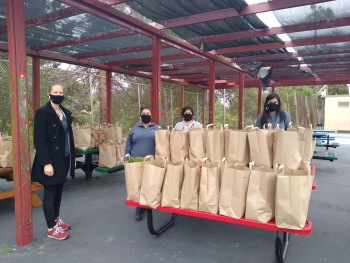
Food Waste Prevention & Recovery Grants
West Oakland-based nonprofit Mandela Partners was founded over 15 years ago with a simple vision: Improve access to fresh fruit and vegetables for all Oakland residents, while supporting local family farmers and community-based businesses. StopWaste grant funding supports outreach for a paid CSA program that supports donation of healthy produce to families in need.

Food Waste Prevention & Recovery Grants
Daily Bowl, a Union City-based nonprofit, gleans surplus produce and groceries from farmers markets, farms, grocery stores, and restaurant wholesale distributors, and redistributes this surplus food to nonprofits that serve low-income and vulnerable populations in the Tri-City areas of Fremont, Union City, and Newark. StopWaste supports their mission to increase recovery of surplus food and reduce waste in the Tri-City area by expanding outreach to donors and redistribute food to feed community groups and families in need.
Reuse & Repair Grants
Medshare is a nonprofit that works with hospitals, distributors, and manufacturers in Alameda County and beyond to collect and redistribute medical products to healthcare facilities in medically underserved communities overseas as well as locally. In fiscal year 2019 alone, it provided $16.9 million of medical supplies to 1.7 million patients, while diverting 2.4 million pounds of material from the landfill.